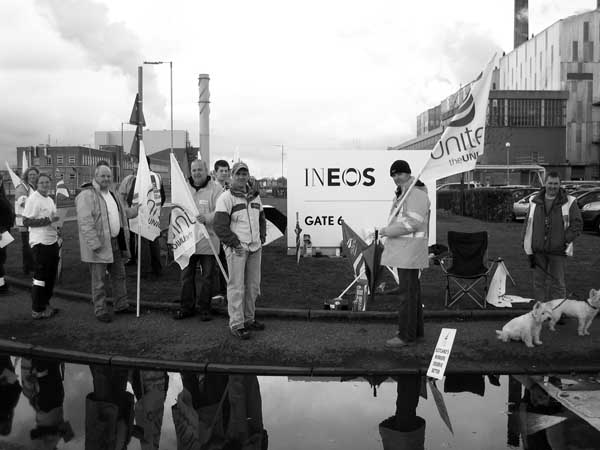Lockout blackmail at Ineos
WORKERS, NOV 2013 ISSUE
Swiss-based multinational Ineos (the world’s fourth largest chemicals company) imposed what amounts to a lockout on its Grangemouth oil refinery and petrochemical plant – demanding a no-strike agreement, a degrading of wages and pensions and threatening closure (as Workers went to press).

Workers on the picket line at Ineos, Grangemouth, in April 2008, fighting for their pensions. Now the company is threatening permanent closure of this vital piece of Britain’s infrastructure
Photo: Workers
The union Unite called off a strike over victimisation planned for 20 October “in the national interest” and “in order to protect this national asset from the scandalous behaviour of its owner”, saying the reckless full shutdown could risk destroying the plant.
Now SNP leader Alex Salmond has asked Unite to sign a no-strike agreement with the company, which moved its HQ out of Britain three years ago. Ineos was accused at the time by the TUC of trying to save £406 million in tax over five years.
Alf Young pointed out in The Scotsman that the financial crash of 2008 had reduced Ineos founder Jim Radcliffe’s personal fortune from £3.3 billion to £150 million. One result was the 2011 formation of Petroineos, a 50:50 joint venture with PetroChina (part of the China National Petroleum Corporation). Petroineos combines the refining operation at Grangemouth with Ineos’s other refinery near Marseille, France. One possibility is a sell-out of its stake in these refining operations to China in order to concentrate on the core Ineos chemicals business. That scenario, and even the current shutdown, compromises the viability of BP’s Kinneil plant nearby. Oil and gas from the central North Sea fields are delivered there for processing, refining and export, utilising steam and energy from the power station in the Grangemouth Ineos site. Kinneil accounts for nearly 40 per cent of the entire oil production in Britain. ■